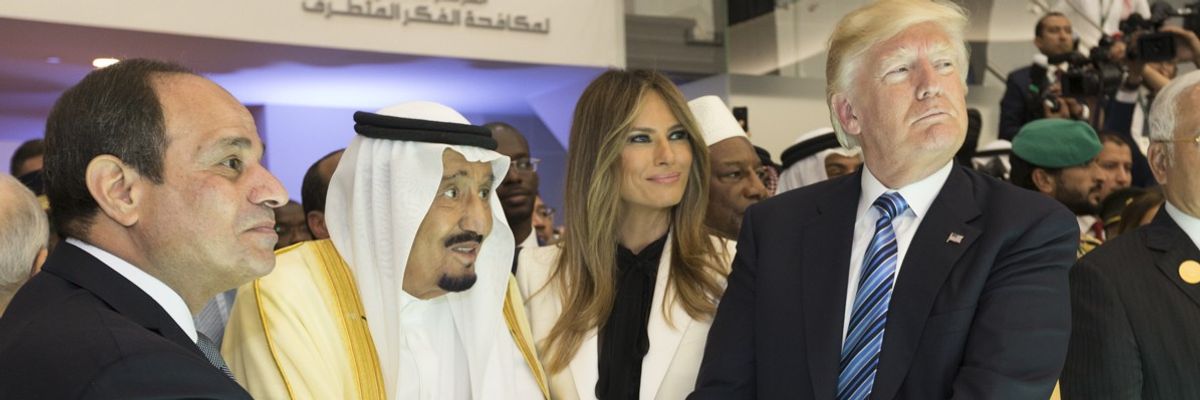Looking back at the last four years, it is clear that President Donald Trump emboldened the governments of Saudi Arabia and the United Arab Emirates (UAE) to be more hawkish throughout the Middle East.
Since January 2017, these two Arab states have viewed Trump’s presidency as an invaluable and unique opportunity for bold moves in the region to achieve longstanding objectives that would have been too risky to undertake during all pre-Trump U.S. administrations, Republican and Democratic alike. Now, with President-elect Joseph Biden taking over, the big question is what steps his administration will take to curb their maximalist foreign policy ambitions.
Along with Saudi and Emirati military interventions in Yemen and Libya, the three-and-a-half-year-old blockade of Qatar should be close to the top of the Biden agenda. From the perspective of Biden and others who served in the Obama administration, the siege of Qatar and the resulting de facto breakup of the Gulf Cooperation Council as an effective sub-regional institution were unfortunate but foreseeable developments.
The Gulf crisis of March-November 2014, when Bahrain, Saudi Arabia, and the UAE withdrew their ambassadors from Doha to protest Qatar’s alleged meddling in their internal affairs, made clear the potential gravity of intra-GCC tensions. In fact, according to then-Deputy National Security Advisor Ben Rhodes, Trump’s predecessor worked hard to prevent the GCC rift over Qatar from escalating, as it did shortly after Trump’s famous visit to Riyadh on his maiden voyage abroad as president in May 2017.
Although the Trump administration, after briefly supporting the blockade, has attempted to reconcile the parties in the interests of rallying all six GCC member states against Iran, such efforts have proved futile. Some analysts believe Washington should apply more pressure on Saudi Arabia, Bahrain, the UAE, and Egypt to lift the blockade, even to the extent of slowing or halting arms sales until these Arab states settle their rift with Qatar whose Al Udeid Air Base has served as U.S. Central Command’s forward operating base in the region since 2003.
“One of the first Middle East moves the Biden administration should make is to publicly call upon Saudi Arabia to end the boycott immediately, backed by an intention to take the matter before the United Nations Security Council if necessary,” according to the Atlantic Council’s Christopher Hunter. “Such a move should be part of a broader global restoration of the primacy of the rule of law and democratic principles and an explicit rejection of the permissive global environment Trump created for lawless rulers to act on their totalitarian tendencies without fear of consequences.”
Similarly, Michael Eisner and Sarah Leah Whitson of the recently launched Democracy for the Arab World Now have predicted a harder line from Biden. “A Biden administration will not have the same patience for their antics, and might well employ levers to pressure [Saudi Arabia and the UAE] to end the blockade that President Trump wouldn’t consider,” they wrote.
At the same time, Saudi Arabia may reconcile with Qatar in order to buy some goodwill with the Biden administration. Officials in Riyadh are nervous about how the 46th American president may revisit the U.S.-Saudi partnership and punish the kingdom’s leadership for various actions which it took during Trump’s presidency such as the gruesome murder of Jamal Khashoggi at the Saudi consulate in Istanbul in October 2018, as well as its catastrophic five-year-old military intervention in Yemen’s civil war.
Some pundits maintain that signing a diplomatic accord with Israel is a move that Crown Prince Mohammed bin Salman, or MbS, has to take to prevent a “collapse” in the Riyadh-Washington partnership in the post-Trump era. Yet any deal with Tel Aviv would come with major political risks for the Al Saud rulers—both domestically and regionally. With the majority of Saudi citizens favoring rapprochement with Qatar, ending Riyadh’s involvement in the blockade would entail far less risk for MbS and those around him.
However, when it comes to the UAE, the picture is different. From Washington’s perspective, the Emiratis are not implicated in the Khashoggi affair. The UAE is no longer directly involved in Yemen, and Abu Dhabi signed the Abraham Accords with Israel. These factors mean that, compared to Saudi Arabia, the UAE has to much less to worry about in terms of detoxifying its reputation in Washington—particularly among Democrats who will be in control of the White House and at least one chamber in Congress in just two months.
The UAE may thus have less incentive to repair its relationship with Qatar in order to please the incoming administration and U.S. lawmakers. The costs would be higher too given the extent to which Abu Dhabi has rigidly framed the Qatari “threat” in ideological terms, which makes it more difficult for the leadership to abandon its campaign to isolate Doha.
Biden’s accession to the presidency will likely force Riyadh and Abu Dhabi to give up hope that an unconventional and transactional White House, which has already swung from one side to the other on the blockade, might swing back toward them if given an opportunity. However, MbS’s reluctance to break with his mentor, Crown Prince Mohammed bin Zayed of Abu Dhabi, will make it more difficult for the Biden administration to pry the Saudis away from the harder-line Emirati stance. The Saudi leadership may instead propose military disengagement from Yemen as a sufficient “gesture” to gain credit with the new administration without antagonizing the Emiratis.
As such, members of the Biden administration tasked with Middle East policy will inherit a dispute that originated in the “alternative facts” free-for-all of the opening months of the Trump presidency and which looks likely to outlast it. The Gulf rift is thus illustrative of the consequential shadow that the Trump administration will cast over its successor as crises that began on Trump’s watch have solidified into intractable impasses.
















